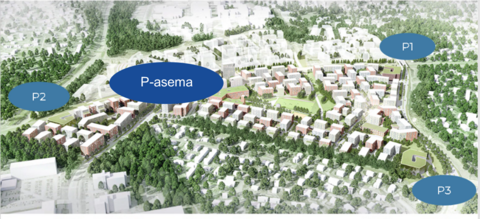Could indoor car parks be the service hubs of the future?
In an ideal situation, an indoor car park would not only be a passive storage for cars but an active space offering everyday services. The interviews conducted during the spring examined the challenges related to the additional services of parking companies. The case area chosen was Kera where four indoor car parks with their own parking companies are being planned. Based on the interviews, incorporating various services into car parks creates tax- and schedule-related risks for the parking company.
SOK, Pohjola Rakennus and YIT have established the first parking company for Kera, Keran Pysäköinti 1 Oy. The car park P1 will be completed alongside the first residential buildings at the end of 2024, which means that it will be available when the first residents move into the area. There will be about 530 parking spaces.
Kera wanted to find out how other everyday services benefitting the residents could be introduced in the car parks. In spring 2023, we and WSP Finland Oy conducted an interview survey of the challenges related to the additional services. The interviewees were partners of Keran Pysäköinti 1 Oy, Kera area project managers, parking operators and WSP parking experts. The interviews examined different operators’ opinions on the additional car park services such as electric charging, a communal car service, car washing services or parcel and postal services.
Parking companies want to provide services
In principle, the interviewees had a positive attitude towards the development and provision of car park services. Of the potential additional services, electric charging was is obvious choice and the communal car service has a lot of potential. Possible services include car washing services and bicycle parking, but the operators had some reservations about the other services such as grocery deliveries, collection points, tyre storage and tyre change services, equipment rental services, and parcel and postal services.
The interviews identified several challenges related to the services to be provided in the car parks. One challenge identified is the fate of value-added tax deductions. As a rule, parking operations, i.e. the renting of areas for parking vehicles, are subject to value-added tax which means that the value-added tax of the related procurements and investments can be deducted. However, if parking operations form an economic entity together with the transfer of the right to use a property exempt from value-added tax, the parking operations are also considered exempt from value-added tax. “It is understandable that if there is no guarantee that the right to deduct value-added tax will remain, the risk of losing it will not lead to additional services being recorded in the articles of association of parking companies,” says Juhani Bäckström, Project Director at WSP Finland Oy.
Another big challenge is timing. When a parking company is established, it takes 5–10 years before there is a demand for additional services. A company’s founding partners do not have a clear financial interest in implementing additional services or enabling them. This means that the main problem is finding someone willing to pay. Parking spaces are expensive and if to their price is added provisions for operations that do not yet have entrepreneurs, the additional cost is borne by the residents.
Some services involve practical risks and requirements, such as fire safety regulations concerning tyre storages and water management solutions required by washing facilities. The combining of car parking and bicycle parking also involves safety risks if, for example, the cars and bicycles use the same ramps. Enabling such additional services requires the parking company to be proactive and to take into account flexibility for change as early as the planning of the park so that the facilities and technology to be built later for the use of an external service provider are suitable. The customers' willingness to pay is not yet known at this stage.
Parking has developed well
Based on the interviews, the additional services directly related to parking or cars have very good potential. The challenges of the other additional services are seen as financially big risks, because parking is already expensive as it is. However, parking has been developed well in both the Kera plans and in other areas. For example, there has been a shift from plot-specific parking to centralised parking and the car parks are located on the edges of the area, which means that internal car traffic is minimal and there is more room for other functions. In addition, there is preparedness to reserve good parking spots located near the entrances for communal cars and the possibility of charging electric cars will be ensured. Organising parking requires significant investments. It is important that the investments are made in a manner that takes into account both financial and ecological sustainability.
“The goal for Kera is that car park services would be part of the overall solution that enables smooth daily life and promotes the use of sustainable modes of transport. For example, feeder-traffic parking by good public transport connections is part of this overall solution,” says Mari Päätalo, Development Manager at the City of Espoo.
The interview survey was conducted as part of the project “Solution path to sustainable growth ecosystems” (RAKKE), which is funded by the Uusimaa Sustainable Growth and Vitality Support (UKKE) funding.
